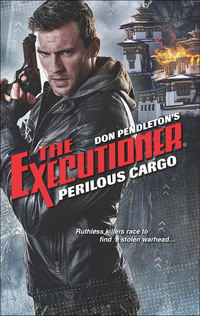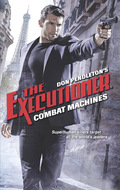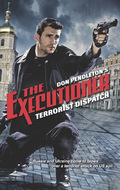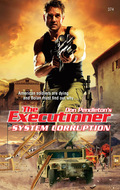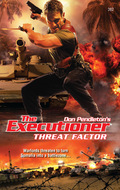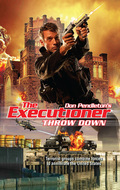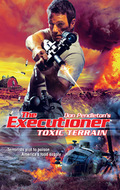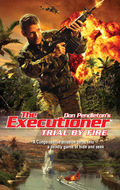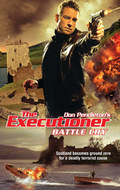Kitab fayl olaraq yüklənə bilməz, yalnız mobil tətbiq və ya onlayn olaraq veb saytımızda oxuna bilər.
Kitabı oxu: «Perilous Cargo»
HIDE-AND-SEEK
The Himalayas become a deadly hunting zone when a nuclear warhead is stolen from a black-market warehouse in Kathmandu. Knowing the incident could start World War III, the President sends Mack Bolan and a CIA operative to retrieve the weapon in the treacherous border region between Tibet and Nepal.
But the U.S. isn’t the only country in the search. Bolan and his ally are up against cunning Chinese and Russian assassins, and several local warlords are vying for the valuable nuke, as well. These competing parties are determined to reach the weapon first—no matter how many witnesses they eliminate on the way. With few alternatives and the trail of innocent blood growing longer, Bolan accepts the help of an old spy. But can he be trusted? With the harsh mountain terrain working against them, the Executioner will need to rely on his wits to win this race…because coming in second is not an option.
“Jump clear!” the pilot yelled.
“The wings are completely iced over!”
The doors opened and immediately the wind and pelting ice slashed at them. Bolan shoved the equipment container forward, trying to push it into the opening. Nischal leaned down to help, then stumbled in the gusting winds.
That was all it took for the icy air to snatch her. She rolled toward the opening away from Bolan’s outstretched hand.
“We’re going down!” the Major yelled. “Get clear! We’ll hold it as long as we can!”
Nischal continued the slide and Bolan saw her reach for and miss the chance to grab one of the support struts on the ramp. She spun around again and her chute snagged on a piece of metal sticking up from the very edge of the ramp. He couldn’t hear it over the howling wind, but he could imagine the tearing sound it made.
Her eyes met his and he knew there was nothing for it. He jumped, trying to catch her, but by then she’d torn free and begun the long fall to the ground. Bolan glimpsed the ragged remains of her parachute, still hung up on the cargo bay doors, and at the edge of the ramp, their equipment.
Then he, too, was free-falling into the storm.
Perilous Cargo
Don Pendleton

Man’s enemies are not demons, but human beings like himself.
—Lao Tzu
Anyone who makes himself an enemy of innocent people is an enemy of mine. And he doesn’t have long for this world.
—Mack Bolan
Table of Contents
Cover
Back Cover Text
Introduction
Title Page
Quotes
PROLOGUE
CHAPTER ONE
CHAPTER TWO
CHAPTER THREE
CHAPTER FOUR
CHAPTER FIVE
CHAPTER SIX
CHAPTER SEVEN
CHAPTER EIGHT
CHAPTER NINE
CHAPTER TEN
CHAPTER ELEVEN
CHAPTER TWELVE
CHAPTER THIRTEEN
CHAPTER FOURTEEN
CHAPTER FIFTEEN
CHAPTER SIXTEEN
CHAPTER SEVENTEEN
CHAPTER EIGHTEEN
CHAPTER NINETEEN
CHAPTER TWENTY
CHAPTER TWENTY-ONE
CHAPTER TWENTY-TWO
Copyright
PROLOGUE
Not far from the warehouse, he walked silently over the small stone footbridge that crossed the Bagmati River. Farther upstream, temples lined the banks of the waterway the Hindus and Buddhists believed was holy, but the man was not interested in the spiritual potential of the water—only the rippling, gurgling sound that helped hide his movements. The moonless sky ensured there were plenty of shadows, and the late hour left the streets empty and quiet.
Kathmandu was unlike any other city in the world. It was a city of contradictions—wealthy tourists mingled with poor-by-choice monks and hotels catering to the rich found near ancient shrines. Nepal was a strange place, and Kathmandu, a crossroads of religion, money, crime and constantly shifting political powers, was the hub. He liked it, though he was glad that this night would see him on his way home.
With no fear of being seen by late-night tourists in the remote district, he found the stone shrine he’d been seeking, reached inside to find the switch and slid the hidden panel aside. Cobwebs and dirt covered the handle, but he wiggled it back and forth, eventually pulling it free of its lock. Below the shrine, the opening for the staircase came free, revealing a steeply twisting set of stone stairs. He stepped inside and used another mechanism to close the panel behind him.
The man ignored the torch holders and slipped his night-vision monocle into place. The corridor hadn’t been used in years and he chuckled to himself. Some secrets were just forgotten, waiting to be exposed. He knew many of them, in cities and countries far and near. In fact, some might say he was a walking, talking secret himself.
The descent ended and a long corridor stretched ahead of him. He knew the hallway extended beneath a small market square, then a fenced parking area and, eventually, the warehouse. People walked over this passage every day, ignorant of its existence. Part of it was caved in, but he faced nothing more difficult than scrambling over a dirt mound. He paused, caught his breath and then climbed another set of stone stairs that ended in a sealed door above his head. This one opened onto the warehouse floor.
The escape tunnel had originally been dug by monks decades before inside a small temple. Later, the temple had been torn down and the warehouse had been built in its place. During the fall of the USSR, some factions within Russia had needed a facility and thus purchased it for their own use.
The man peered at the door, then found the small niche that would, hopefully, open it after all these years of disuse. He needed all of this to work. And it did. The door opened a crack, enough for him to pull himself up and inside a small office in the warehouse itself. So far, he’d triggered no alarms.
He slipped in, then snuck through the open office door and moved along the wall toward an interior sentry, half-asleep at his post. The man pulled a knife out of his boot. His movements were so swift the sentry had no time to shout as the man clasped a hand over his mouth and shoved the tip of the blade into his carotid artery. He lowered the guard to the ground as he grabbed his ID. After edging along the wall to the main entrance, the man swiped the guard’s badge along the electronic keypad and watched the lights flash as the bay door began to open.
He sprinted back toward the massive platform truck with the nuclear warhead attached and began to climb into the cab. Shots rang out and ricocheted off the door. He turned, drawing his own weapon, and fired back, knocking the assailant down in one shot. There was no time for playing around.
He got behind the wheel and started the truck. The warehouse doorway was beginning to fill with Russian soldiers, most of them milling around in confusion. He reached out the window and opened fire, scattering the sentries as they looked for cover. He shifted up another gear and drove through the door before they could lower it again.
He didn’t bother to head for the gate, just aimed for the nearest section of chain-link fence and tore through it. The bullets bouncing off the truck didn’t bother him. As soon as he cleared the facility he checked his mirrors. No one was in pursuit. The man smiled, knowing the chaos he’d caused would keep them busy. He shifted into high gear and headed for the Friendship Highway.
Everything would be different now. It was only a matter of time.
CHAPTER ONE
As Hal Brognola, the director of the Sensitive Operations Group based at Stony Man Farm, walked down the silent hallway, he knew that whatever was waiting for him in the Situation Room probably wasn’t something he wanted to hear. He sighed and stopped in front of the door, where a silent Marine guard waited. Brognola removed his Justice Department ID card, held it up for the Marine’s brief inspection, then swiped it through the reader. The Marine opened the door for him, then stepped aside smartly. “Good evening, sir,” he said.
“Want to bet?” Brognola growled under his breath.
Stony Man Farm was a covert operations base whose existence was known by a very few and whose director answered directly to the President. Its missions were varied, ranging from domestic anticrime and terrorism to foreign intelligence operations—anything that the United States couldn’t officially be seen—or get caught—doing. Brognola had been in charge for a long time, which perhaps explained why he went through so many antacids in a given day and certainly explained why he knew that a call from the White House at two in the morning wasn’t good news.
Inside the Situation Room he’d expected to find a large assortment of military brass, but he was startled to see only one man: the President himself. At the moment, his back was to Brognola as he watched some spy satellite footage playing on one of the many video screens in the room. He turned when the door shut.
“Hal,” he said, pausing the feed. “Thank you for coming in.”
“Of course, Mr. President,” he said. The two men shook hands. “What’s the situation?”
The President laughed. “You always come straight to the point, Hal. It’s one of the reasons I like you.”
“You don’t call me at this hour if there isn’t a situation, sir. Usually a bad one.”
“True enough, and this one is more precarious than I’d like, Hal, which is why the only people here at the moment are the two of us. If the Joint Chiefs heard about this, we’d have no way to contain it. As it is, I’ve had to seal everything with ‘Presidential Eyes Only,’ and anyone else who’s seen it has been sent on a long vacation with direct orders to keep their mouths shut.”
“That doesn’t sound precarious, Mr. President,” Brognola said carefully. “That sounds like an end-of-the-world kind of problem.”
“The truth is, Hal, we could be looking at a major disaster, but I think—with your help—we might be able to get on top of it.” He turned and restarted the video feed at the beginning. “This is a clip from one of our satellites as it passed over Kathmandu about twelve hours ago. Routine surveillance, so the angle isn’t very precise. The analyst who saw this come through cleaned it up and damn near wet himself.”
Brognola didn’t speak but took up a position next to the President and watched the screen. The blurred images solidified, showing a mobile launching platform, complete with a nuclear warhead and rocket, moving away from a large building. Guards were shooting at the vehicle, but it was heavily armored and kept right on going, hitting the road and then disappearing from the frame. The data analyst was clearly on his game because the next sequence showed the truck on a deserted highway, heading away from the city. Then it was lost again.
“Did he do any still image enhancement?” Brognola asked.
The President nodded and typed in the commands, bringing up the slides. The side of the rocket was in shadow, but the markings were unmistakable. They were Russian.
Brognola nodded thoughtfully, then took a seat at the conference table. After the Cold War, the Soviets had either lost or hidden a large number of nuclear weapons, though which one this represented was impossible to say. “I was right, Mr. President,” he said. “Precarious was an understatement. Who else knows about this?”
“The director and deputy director of the CIA, the Vice President, and you,” he said. “Plus the soon-to-be-vacationing analyst.”
Brognola cleared his throat. “Don’t let the analyst go anywhere,” he advised. “In fact, have him brought in on some pretense. Arrange for him to be held until this is over.”
“You’re afraid he’ll talk?”
“If he hasn’t already, yes, I am. Let’s find out for sure if he’s made any calls or spoken to anyone since his debrief, and hold anyone he’s even said good-night to. He knows there’s a nuclear missile roaming around in Nepal or Tibet. I’d suggest we take him out of circulation immediately.”
The President glanced at his watch. “He’s still in with the deputy director, going over it all one more time. Give me a moment.” He picked up a phone, dialed, then spoke softly into the receiver. “It’s done,” he said. “They’ll keep him at Langley for the time being.”
“Good. Now, who else knows?”
“I already told you, Hal—”
“Excuse me, sir, I mean which countries?”
“Well, we’ve got to assume the Russians know—it’s their damn missile that’s been stolen.”
“Did we have any indication that they were housing arms in Kathmandu?”
“There were plenty of rumors at the end of the Cold War, of course, but that’s all they were at the time—rumors. The intelligence coming out of the former Soviet Republic was terrible. The CIA didn’t have anything concrete or we’d have moved on it long ago.”
“But the CIA had something?”
“One field agent offered up an unconfirmed report, but it was little more than something he’d heard.”
“Based on what we’re seeing here, I’d say it’s been confirmed,” Brognola said.
The President stood and paced while Brognola gathered his thoughts.
“Sir, if China finds out...” he started.
“Then any hope we have for Tibet is lost,” he finished. “Worse, if that damn nuke gets launched into China...”
“Then we could be looking at World War III.”
“Exactly,” the President said. “That seems like a pretty good reason to kick you out of bed, wouldn’t you agree?”
“No complaints, Mr. President.”
“All right, so what do you recommend?” he asked.
“Have we had any contact with the thief? Any ransom or other demands?”
“No, and I think that’s more troubling than anything. Someone after money and power we can negotiate with, but a true believer of some kind or another...”
“In Nepal or Tibet?” Brognola asked. “Is there anything happening with the Chinese that might have motivated this from inside either country?”
“Not that we’re aware of, but I’ll dig a little deeper into that and see if they’ve managed to keep something from us. We don’t know yet what we’re dealing with. If the person who stole it has an agenda, then we’ve got nothing to give them and no room to negotiate. So I’ll ask again, Hal—what are your recommendations?”
“We go in fast and quiet. Striker’s the best man for this kind of job—hell, he’s the only man for this kind of job.”
The President nodded. “Fast and quiet it is, then,” he said. “Maybe we’ll get lucky and we can put a lid on this before we’ve got every warlord and criminal in the region going after the warhead, let alone China.”
“It’s possible,” Brognola said. “Anything else, sir?”
“I want to add one to your team,” the President replied. “An expert on the region and in the field. Two is better than one on this hunt in case something goes wrong.”
“Sir, Striker doesn’t always work and play well with others. It’s just his nature.”
“He will this time, Hal,” the President said. “And that’s not nature—it’s an order.”
“Yes, sir.” Brognola got to his feet.
“Oh, and Hal?”
“Sir?”
“Let’s not drop the ball on this one, okay? I’d hate to have to be the first President since Truman to be responsible for a nuclear holocaust.” The President was staring at him very intently, his eyes clear and focused.
“You know that Striker has never dropped the ball, sir,” Brognola said. “And he won’t now.”
CHAPTER TWO
Mack Bolan had been to the National Mall on a number of occasions, but it was almost never to revel in the monuments to the people and values that had built this country, let alone enjoy the park space. Not that he wanted to play the tourist, but he wouldn’t mind coming here once or twice for reasons less imperative than the end of the civilized world. Still, when Hal Brognola had called him early that morning and said they needed to meet immediately, he knew from experience that somewhere in the world his skills were needed.
As he approached the bench where Brognola had suggested they meet, he was surprised to see a woman seated next to the big Fed. The sun had only recently come up, and they appeared to be the only people out on the Mall at the moment. The pair was deep in conversation, and Bolan cleared his throat to announce his arrival.
The woman turned around slowly. “Colonel Stone, I presume?” she said, rising to her feet. “I feared we’d be waiting on you all morning.” She shook Bolan’s hand and then turned back to Brognola. The action offered an alluring glimpse of her slender neck hidden by long, black hair that fell almost to the small of her back. “I was just running out of stories to tell to fill the time.”
“I rather doubt that,” Bolan said. “Hal.”
“Colonel Stone,” Brognola said, also rising to stand. “Thank you for coming. Let me introduce you to Alina Nischal. She’s vital to the mission we’re about to discuss.”
“Pleasure,” Bolan said.
Brognola handed Bolan a foam cup of coffee. “Let’s walk.”
As they crossed the Mall in the cool morning air, Brognola filled them in on the situation. “Approximately forty-eight hours ago, a small nuclear missile, an RT-2PM, on a mobile launching platform was stolen from a secret Russian holding facility in Kathmandu, Nepal. Based on satellite images, it appears to be a complete system, ready for service. The last image we picked up tracked it leaving the city and heading north, toward the border with Tibet.”
“Is there any chance it’s the Russians stealing one of their own weapons?” Bolan asked. “The black market in that part of the world sells pretty much anything and everything.”
“We don’t think so,” Brognola said. “But we can’t discount that possibility.”
“Do we know who might have access to that base outside of the Russians?” Nischal asked.
“If we did, this mission would be a whole lot simpler,” Brognola told her. “It seems likely that there’s been plenty of money thrown around to keep this facility off the radar, but as of right now we don’t know who has it and what their intent may be.”
“So, you want me to go and recover it?” Bolan asked.
“It’s a little more politically complicated than that,” Brognola replied. “It’s crucial, yes, to recover the weapon, but there’s more at play than just the danger this rogue weapon represents. If we can get our hands on it before the Russians do, we can prove that they haven’t lived up to the treaties we’ve signed. Which means a lot of concessions from them at the bargaining table, especially in regard to places like North Korea and Pakistan.”
“And if the Russians recover it first?” Nischal asked.
“Then they’ll have complete deniability and we’ll lose our advantage. There are other considerations, too. It’s only a matter of time until the Chinese learn something’s going on. Depending on how this plays out, they could decide to launch a military action in Tibet. Worse, if that weapon is launched, then we could be looking at the beginning of World War III.”
Bolan nodded thoughtfully. “That’s an eight-hundred kiloton weapon with a range of over six thousand miles. Whoever stole it could blow a pretty big hole in a lot of places...India, China, the Middle East.”
“Great Britain, America,” Nischal added. “Not to mention that a weapon like this violates the very sanctity of what many in the area believe. It could divide the region, sending many into prayer and others off to war. This weapon could cause huge upheaval even if it doesn’t blow anything up.”
“Hal, how do you want to play this?” Bolan asked.
“It’s straightforward enough. We’re going to send you in fast and quiet. Retake the weapon and deliver it to Delhi, where we’ll have a transport waiting to get it to the United States. After, you’ll go back and ensure that we’ve got on-the-ground intelligence on the facility to confirm our claims.”
“How are we going in?” Nischal asked.
“We?” Bolan said. “Who said anything about ‘we’? I assumed you were here because you had some kind of intelligence on the situation.”
“Colonel Stone, Alina is an expert on the region and she speaks all the languages, including the dialects. Both of you will be going.” Brognola’s voice was firm.
Nischal smirked. “Don’t worry, Colonel. I’m field qualified in weapons, hand to hand and tactics.”
“All right,” Bolan said. “Let’s just hope you can live up to your training. Given the danger, I imagine the alternatives to coming up short will be less than pleasant.”
“I’ll carry my weight,” she replied coolly. “And yours, too, if it comes to that.”
“It won’t,” he said, then looked at Brognola. “What kind of insertion are you planning?”
“We’ve got a B-2 Spirit on ready alert at Andrews. You’ll do a HALO jump just over the border in Tibet.” He brought up a map of the region on his phone and showed it to them. “This is a pretty desolate area, but there are several warlords operating in the region, according to our latest intel, so watch yourselves.”
“What do we have on them?” Bolan asked. “Anything specific?”
“No one passes in or out of that region without at least one of them knowing,” Nischal said. “There is one operative who knows everything there is to know about the players in that area, though.”
“And who might that be?” Bolan asked.
She raised her hand and fanned her fingers in the air, waving them daintily. “Don’t worry, Colonel Stone. I’ll take care of you.”
“Let’s see how it goes in the field before we worry about who’s taking care of who,” Bolan said dryly.
“And on that charming note, I believe I’ll go and get ready. I’ll meet you at Andrews, Colonel.” She turned and added a respectful goodbye to Brognola.
Bolan watched her saunter off and shook his head. Hopefully, she was more than a pretty face and a sharp mind.
“Hal, we didn’t cover this, but how do you expect me to get that damn missile—assuming I can find it—from Tibet all the way to India?”
The big Fed shrugged. “My guess is you’ll have to drive it.”
“Drive it!” Bolan choked. “You’re talking about more than five hundred miles, in hostile territory, in what’s likely to be lousy weather.”
“Don’t forget all the mountains and the wind,” Brognola said, chuckling. “Just like when you walked to school back in the day.”
“Very funny,” he said. “I’m serious. You want me to drive it to Delhi?”
“Unless you come up with a better idea once you’ve got it, that’s the only move we’ve got in this case.”
Bolan sighed heavily and started to say something, but Brognola cut him off. “Before you say anything else about Alina, you know that I can’t override the President of the United States. He wants her along and he trusts her for some reason.”
“Hal, you’re sending us into hostile terrain while we try and track down a nuke. I’ll spend the whole mission trying to make certain she isn’t killed, and that’s assuming she survives a HALO jump out of the cargo bay of a stealth bomber in a country not known for its charming weather conditions.”
“Don’t count her as baggage just yet, Striker. I’ve read her file, and I think she’ll give you a run for your money. She’s the real deal and has been working in the field for the CIA for over a decade. She can handle herself.”
Bolan wasn’t entirely convinced, but the deal was done. There was no point in arguing any further. “Have a nice trip, Striker,” Brognola said. “Try to leave something in Nepal standing. The Chinese will know we’ve been up to something if Mount Everest isn’t there next week.”
“I’ll do my best.”
“You always do,” he said. “That’s why I’m sending you.”
Pulsuz fraqment bitdi.
